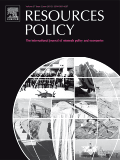
Resources Policy
Scope & Guideline
Empowering Interdisciplinary Insights in Resource Management
Introduction
Aims and Scopes
- Natural Resource Management and Policy Analysis:
The journal emphasizes the analysis of policies related to the management and governance of natural resources, examining their effectiveness in promoting sustainable practices and mitigating resource-related conflicts. - Economic Impact of Resource Utilization:
Research often investigates the economic implications of natural resource extraction and utilization, addressing how these resources can drive economic growth while also considering the potential for economic dependency and the resource curse. - Environmental Sustainability and Climate Change:
The journal increasingly incorporates themes related to environmental sustainability, focusing on the impacts of natural resource exploitation on ecological systems and the role of renewable energy in transitioning towards a low-carbon economy. - Technological Innovation and Resource Efficiency:
There is a distinct focus on the role of technology in enhancing resource efficiency, with studies exploring how innovations can improve sustainability in resource extraction and utilization. - Social and Community Impacts of Resource Development:
The journal explores the social dimensions of resource management, including community engagement, social license to operate, and the socio-economic impacts of mining and resource extraction on local populations.
Trending and Emerging
- Integration of FinTech in Resource Management:
There is a noticeable increase in research exploring the integration of financial technologies (FinTech) in managing natural resources, indicating a trend towards innovative financing solutions for sustainable practices. - Climate Change Mitigation Strategies:
The journal is increasingly focusing on climate change mitigation strategies related to natural resource management, reflecting a global urgency to address climate impacts through effective resource policies. - Circular Economy and Sustainable Resource Utilization:
Emerging themes around the circular economy and sustainable resource utilization are gaining traction, emphasizing the importance of recycling and reusing materials in resource management. - Geopolitical Risks and Resource Markets:
The relationship between geopolitical risks and resource markets is becoming a prominent theme, with studies analyzing how international tensions affect resource prices and availability. - Social Equity and Gender in Resource Management:
Research focusing on social equity, particularly gender issues in resource extraction, is becoming more prevalent, highlighting the need for inclusive practices in resource governance.
Declining or Waning
- Traditional Resource Extraction without Sustainability Considerations:
There appears to be a waning emphasis on studies that solely focus on traditional extraction methods without integrating sustainability considerations, as the journal increasingly promotes sustainable practices. - Narrow Economic Analyses without Environmental Context:
Previous research that primarily analyzed economic outcomes of resource extraction in isolation from environmental impacts is becoming less prevalent, as interdisciplinary approaches gain prominence. - Static Policy Frameworks:
Research that employs static policy frameworks without considering adaptive management strategies or dynamic environmental contexts is declining, as there is a growing recognition of the need for flexible and responsive policy mechanisms.
Similar Journals
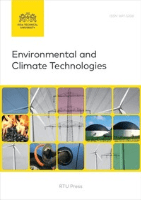
Environmental and Climate Technologies
Bridging Science and Sustainability for Global Impact.Environmental and Climate Technologies is a premier open-access journal dedicated to advancing knowledge in the fields of environmental science and renewable energy. Published by SCIENDO since 2009, this journal plays a crucial role in disseminating innovative research and interdisciplinary studies that address the pressing challenges posed by climate change and sustainable development. With its current positioning in the Q2 quartile for Environmental Science (miscellaneous) and Q3 for Renewable Energy, Sustainability and the Environment, it is recognized for its significant contributions to the academic community, ranking #107 out of 233 in General Environmental Science and #161 out of 270 in Renewable Energy. Hailing from Germany and operating under an open-access policy, Environmental and Climate Technologies ensures that research remains accessible to a global audience, fostering collaboration and discussion among researchers, professionals, and students alike. The journal invites rigorous scientific inquiries and practical solutions that can mitigate the impact of climate-related issues, making it a vital resource for those committed to environmental stewardship and sustainability.
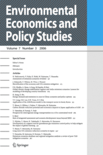
Environmental Economics and Policy Studies
Navigating the Complexities of Environmental EconomicsEnvironmental Economics and Policy Studies is a premier academic journal published by SPRINGER, focusing on the intersection of environmental sustainability and economic policy. With a robust ISSN of 1432-847X and an E-ISSN of 1867-383X, this journal serves as a vital resource for researchers, policymakers, and practitioners looking to understand and address the complex issues surrounding environmental economics. Hailing from Japan, it has carved a significant niche in the field since its inception, achieving impressive rankings with a Q2 classification in both Economics and Econometrics, as well as Management, Monitoring, Policy and Law as of 2023. The journal publishes a wide array of high-quality articles, with an emphasis on empirical research and innovative methodologies that influence public policy and economic decision-making. Notably, its Scopus rankings reflect a respectable position within its disciplines, with a percentile ranking of 74th in Economics and Econometrics. The journal continues to contribute to the discourse on sustainable development with a commitment to fostering interdisciplinary research and understanding. Access to this invaluable resource is available through traditional subscription models, making it an essential addition to academic collections for those passionate about the advancement of environmental economics.

Progress in Energy
Pioneering Insights in Energy Technology and PolicyProgress in Energy, published by IOP Publishing Ltd, is an esteemed open-access journal that focuses on cutting-edge research in the field of energy. With its e-ISSN 2516-1083, this journal stands out for its commitment to disseminating high-quality articles that aim to advance the understanding and application of energy technologies and policies. Juggling respectably in the academic arena, it proudly holds a Q1 classification in the energy (miscellaneous) category and ranks 6th out of 73 in the general energy sector, placing it in the top 92nd percentile among its peers, according to Scopus metrics. The journal's scope encompasses a wide range of topics, including renewable energy, energy efficiency, and policy analysis, making it a vital resource for researchers, industry professionals, and students alike. With a publication horizon extending from 2019 to 2024, Progress in Energy invites contributions that push the boundaries of knowledge in energy fundamentals and innovations.

Bulletin of the Tomsk Polytechnic University-Geo Assets Engineering
Advancing Sustainable Solutions in Geo Assets EngineeringBulletin of the Tomsk Polytechnic University-Geo Assets Engineering is a prestigious open-access journal published by the TOMSK POLYTECHNIC UNIV, PUBLISHING HOUSE, dedicated to advancing knowledge in the fields of economic geology, fuel technology, and geotechnical engineering among others. With an ISSN of 2500-1019 and an E-ISSN of 2413-1830, the journal has achieved a notable position in the academic landscape since its inception in 2015, as evidenced by its Q3 quartile rankings across various categories in 2023, including Environmental Science and Materials Science. This journal provides a vital platform for researchers and professionals to disseminate cutting-edge findings, contribute to innovative practices, and engage in meaningful discourse regarding geo assets and their management in the context of contemporary environmental challenges. While the journal continues to grow in impact, it remains accessible to a wider audience, promoting sustainability and responsible resource management. Researchers, industry experts, and students will find valuable insights and the latest developments relevant to these dynamic fields through its comprehensive and rigorous peer-reviewed articles.
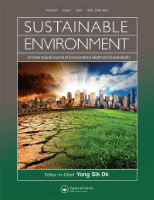
Sustainable Environment
Driving impactful research to tackle environmental challenges.Sustainable Environment, published by Taylor & Francis Ltd, is a pioneering journal dedicated to advancing the field of sustainability studies. Since its inception in 2021, this open-access journal has sought to provide a platform for multidisciplinary research that addresses pressing environmental challenges and sustainable practices. With a commitment to disseminating high-quality research swiftly, Sustainable Environment aims to engage researchers, policymakers, and practitioners across various domains, fostering scholarly dialogue and innovation. The journal covers a broad range of topics, including climate change, resource management, and sustainable development, making it a vital resource for anyone looking to contribute to and understand contemporary environmental issues. With its flexible access options, readers from all backgrounds can benefit from the latest insights and findings in sustainability research, thereby promoting a more sustainable future.

Environmental and Planning Law Journal
Bridging Legal Frameworks with Environmental StewardshipEnvironmental and Planning Law Journal is a significant publication in the fields of law and environmental studies, published by LAWBOOK CO LTD in Australia. This journal, with the ISSN 0813-300X, has established itself as a crucial resource since its inception in 1984, providing a platform for scholarly discourse around legal frameworks affecting environmental planning and policy. Despite its coverage discontinuation in databases like Scopus, its impact remains recognized, achieving a rank of #455 in the Social Sciences Law category, indicating its relevance in legal scholarship. The journal is classified in the lower quartiles, yet it continues to address vital issues in geography, planning, and management of environmental law, engaging with contemporary challenges faced by policy-makers and practitioners. With no open access options currently available, the journal invites subscriptions and institutional access for its valuable content, making it a notable cornerstone for researchers, students, and professionals dedicated to navigating the complexities of environmental law and planning.

Extractive Industries and Society
Innovating Research at the Intersection of Industry and CommunityExtractive Industries and Society is a vital academic journal published by ELSEVIER SCI LTD, focusing on the intersection of extractive industries and their broader societal implications. Established in 2014, this multidisciplinary journal examines economic geology, planning, development, and environmental management issues surrounding the extractive sector. With an impressive impact factor and recognition in category quartiles, it ranks in Q1 in areas such as Development and Geography, and boasts notable Scopus rankings across various fields including Social Sciences and Earth Sciences, underscoring its significant contribution to contemporary research. The journal aims to foster scholarly discourse, providing a platform for rigorous studies that address policy, environmental, and socio-economic challenges linked to extractive practices. By engaging with this journal, researchers, professionals, and students can contribute to and benefit from cutting-edge insights that shape the future of sustainable resource management.

Agricultural and Resource Economics-International Scientific E-Journal
Exploring sustainable solutions for a changing world.Agricultural and Resource Economics-International Scientific E-Journal is a leading open-access publication dedicated to advancing the fields of agricultural and resource economics. Published by the esteemed INST EASTERN EUROPEAN RESEARCH & CONSULTING since 2015, this journal provides a vital platform for innovative research and discourse, particularly within the context of Eastern Europe. With an impressive Q2 ranking in Agricultural and Biological Sciences and Q3 rankings in both Business, Management and Accounting and Marketing, it serves as a key resource for academics and practitioners alike, fostering collaboration and knowledge exchange. The journal's commitment to accessibility and inclusivity is evident through its open-access policy, allowing researchers from around the globe to share and benefit from cutting-edge findings. Set against the backdrop of a rapidly evolving agricultural landscape, this journal plays a crucial role in exploring the intersection of economics, sustainability, and resource management, making it an essential read for anyone invested in the future of these critical fields.
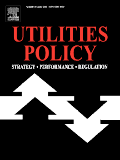
Utilities Policy
Pioneering Insights in Utilities and Public PolicyUtilities Policy is a leading academic journal published by Elsevier Ltd, focusing on the dynamic fields of business, law, economics, and public policy related to utilities management. Since its inception in 1990, this journal has provided a platform for critical discourse surrounding the intersection of utility services, governance, and regulatory frameworks. With an impressive impact factor reflective of its scholarly influence, it ranks in the Q1 quartile across multiple categories, highlighting its significance in Business and International Management, Development, Sociology, and Political Science. The journal serves as a vital resource for researchers, professionals, and students seeking to explore innovative solutions and policy developments within the utilities sector. While primarily available through subscription, Utilities Policy continues to foster a rich academic dialogue by featuring high-quality empirical and theoretical research that addresses emerging challenges in utility services on a global scale.

Chinese Journal of Population Resources and Environment
Bridging Demography and Environmental Science for a Sustainable FutureChinese Journal of Population Resources and Environment is an esteemed interdisciplinary journal published by KEAI PUBLISHING LTD, focusing on the critical intersections of population dynamics, resource management, and environmental sustainability. With an E-ISSN of 2325-4262 and an ISSN of 2096-9589, this Open Access journal has been committed to disseminating high-quality research since its inception in 1992 and has embraced Open Access since 2020. As part of its robust reputation, the journal ranks in the Q1 category for Demography and is recognized in the Q2 tiers for both Environmental Science and Toxicology, reflecting its significant contribution to these fields. The 2023 Scopus rankings highlight its competitiveness, with an impressive percentile of 84th in Demography and 67th in Environmental Science (miscellaneous). Hosted from Beijing, China, the journal serves as a vital platform for researchers, professionals, and students to engage with cutting-edge studies that address pressing global challenges related to population and environmental resources.